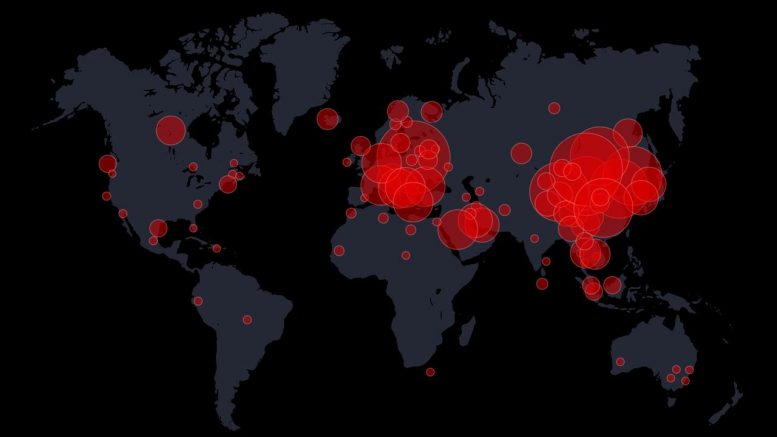Peering into a crystal ball to glimpse how the emerging coronavirus crisis might unfold, bold decisions need to be made, with profound social and economic consequences. In the first of a series of articles, John Egan reports on the early signs and the strategies they support.
Monday 16 March 2020: the day that many Europeans finally awoke to recognise the critical threat to public health posed by the COVID-19 coronavirus. And governments realised that the strategies needed to deal with the evolving crisis were actually more to do with its timeline and that all affected countries would need to employ some form of intensive social confinement.
For weeks Italians have been well aware of the dangers presented by the exponential growth of confirmed COVID-19 cases, jumping from 17,750 to 23,980 in a single day, bringing 1,811 deaths in its wake. The nation’s healthcare system is close to meltdown and the remedy of almost total shutdown and social confinement is in force.
One can expect that what Italy has done and what France is doing today should be seen in the UK in six days’ time.
Comparable numbers for the UK yesterday were 1,391 cases and 35 deaths, giving Prime Minister Boris Johnson space for manoeuvre, with a modest strengthening of advice to limit opportunities for the social transmission of the disease. UK schools and businesses are still operating, as are the theatres, pubs and cafes that line the high streets. The UK government has avoided enforced closure and has, rather ambiguously, limited itself to advising citizens to “avoid” these locations of social interaction.
On Monday the British position evolved rapidly from that taken only thee days earlier where the emphasis was more on mitigation through business as usual, with a hope of managing the speed and scale of viral infection across low-risk groups, such as school children, whilst protecting those presenting higher risks. The expressed aim was to develop a “herd immunity” which could benefit the country in future scenarios when levels of viral infection might rebound.
The Imperial College COVID-19 Response Team did find that the intensive social confinement and other measures that have been seen to supress the epidemic will need to be maintained until a vaccine becomes available, predicting that viral infections will rebound if their suppression is relaxed.
The change of tack in the UK is linked to the publication yesterday of a report produced by the Imperial College COVID-19 Response Team in London, and reported by Buzzfeed. Using predictive modelling, Imperial’s paper suggests that the UK coronavirus mitigation strategy “might reduce peak healthcare demand by 2/3 and deaths by half. However, the resulting mitigated epidemic would still likely result in hundreds of thousands of deaths and health systems (most notably intensive care units) being overwhelmed many times over”.
As a consequence, the only feasible strategy to manage the epidemic is to involve its suppression through a program of social confinement across the nation. Imperial had also presented their conclusions in France with a similar predicted outcome that any mitigation strategy would swamp the health care resources of the country.
On Monday evening President Emmanuel Macron announced the imposition of draconian restrictions on the movement of French residents. For at least 15 days they are to remain at home and restrict venturing outdoors to a very short list of the most essential activities. Fines and even prison await those who choose not to adhere to these instructions and 100,000 police are on the streets to help enforce the new rules.
‘The resulting mitigated epidemic would still likely result in hundreds of thousands of deaths and health systems (most notably intensive care units) being overwhelmed many times over’. Imperial College COVID-19 Response Team
The differing strategies of Italy, France and the UK can be justified as each country is at a different stage of the coronavirus battle, but all are moving towards a seemingly inexorable outcome. People need to begin to see themselves as the vectors that infect the vulnerable. Only when the precipice approaches can individual egos be subsumed into a solidarity for the benefit of all.
Using European Centre for Disease Prevention and Control (ECDC) data reporting the number of confirmed COVID-19 cases from the three countries mentioned above plus Germany, one can see that each country seems to be locked onto the same trajectory, except the UK is 14 days behind Italy, while France is eight days behind its neighbour.

The patterns of exponential growth of COVID-19 cases in UK, Italy, France and Germany are very similar when the curves are adjusted for their different start dates.
One can expect that what Italy has done and what France is doing today should be seen in the UK in six days’ time.
It is widely acknowledged that the numbers of confirmed cases of COVID-19 are likely to be underestimated, as they depend on the availability and frequency of testing, and the data is not reliable. However, the four countries have the exponential growth curve above in common and this is likely to be unaffected by the variability of local strategy and activities.
This pattern of exponential growth in the number of people afflicted in epidemics can be countered by the combination of measures set out in detail by the World Health Organization (WHO), and emphasised in their daily press conferences.
The crisis caused by the COVID-19 coronavirus is rapidly evolving. Stock markets are unstable and national economies are under siege.
Yet, a stable mechanism is in operation. The evolution of confirmed cases at locations where testing is at least reasonably deployed gives a benchmark to assess the efficacy of measures being taken to counter the outbreak, albeit with several days delay. The recovery of China after two months of widespread shutdown is evident below.

Has China succeeded in supressing COVID-19 or will it rebound?
The Imperial College COVID-19 Response Team did find that the intensive social confinement and other measures that have been seen to suppress the epidemic will need to be maintained until a vaccine becomes available, predicting that viral infections will rebound if their suppression is relaxed. This is a point of utmost importance, as the behaviour of the COVID-19 coronavirus in this respect is unknown. If such a virus rebound were to arise, then crisis resolution could be 18 months away. The social and economic costs of this would be extremely high.
Progress in clinical treatments and capacity building, the vaccines and also in antibody tests (serology) to identify immunity and to better understand the enemy all need to play their part.
It is to be hoped that Europe can also count on the degree of social discipline and solidarity, potentially over a prolonged period, necessary to defeat the COVID-19 epidemic against which Emmanuel Macron yesterday declared war.
For related articles on Chief-Exec.com : Click Here

Headline Photo Credit: DigitalMammoth /Shutterstock.com




